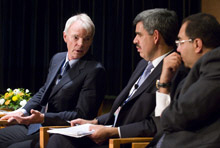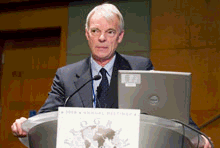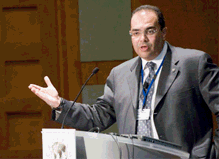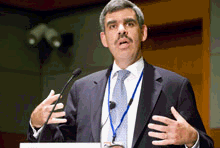
Typical street scene in Santa Ana, El Salvador. (Photo: iStock)
IMF Survey: 'Setback for All' if Financial Turmoil Slows Globalization
October 15, 2008
- Developing economies' growth to slow as turmoil spills to emerging markets
- Policy interventions will result in very different international financial system
- Saying that globalization of finance is a bad idea "would be a tragedy"
Developed and developing economies alike would suffer a major setback if the global financial crisis resulted in a retrenchment in globalization, a panel of economists said.

Spence (l), El-Erian (c), Mohieldin: any postcrisis reversal of opening up world economy would have serious negative consequences (IMF photo)
ANNUAL MEETINGS SEMINARS
In an October 10 discussion during the IMF-World Bank Annual Meetings, several leading economists acknowledged the damage created by the global financial turmoil and the need to repair and rebuild the international financial system.
The panel, discussing "Global Turbulence and the Slowdown in G-7 Growth: Can Developing Countries Sustain High Growth, and How?" accepted that the crisis justifies a major rethinking of the financial sector. But some speakers said that if such a reassessment included any reversal of the general policy of opening up the world economy, it would have serious negative consequences.
The panel also made three other assertions:
• The crisis, which originated in the U.S. market for subprime mortgages but has spread to other credit markets and other advanced economies, was the result of failures at many levels, private and public.
• Developing economies, which had seemed relatively resistant to the credit problems in the advanced economies, will see lower growth as the turmoil spills over into emerging markets.
• The problems are so deep that the dramatic policy interventions governments are making will result in an international financial system that is much different, but that likely will be the result of cumulative responses rather than grand design.
Negative consequences
Michael Spence, Chairman of the Commission on Growth and Development, said that the breadth and swiftness of the spread of liquidity and solvency issues is an indication that global credit markets integrated so fast that policy coordination and regulation could not keep pace. That justifies a major rethinking of the financial sector, but if that spills over into a major rethinking of the "general policy of opening up the world economy or there is some reversal in that, that will have very dramatic negative consequences."

Spence: Global credit markets integrated so fast that policy coordination and regulation could not keep pace (IMF photo)
Mohamed El-Erian, co-chief executive of the U.S.-based asset management firm PIMCO, warned that in coming months there will be a tendency by many to "go beyond the truth, which is that certain financial instruments were abused" because of inadequacies in the current financial architecture, to "saying that globalization of finance is a bad idea. That would be a tragedy."
Spence and Mahmoud Mohieldin, Egypt's Investment Minister, said that the economic advances of most developing and emerging economies have been the result of a stable and open world economy.
Sharply higher growth
Egypt introduced economic reforms in 2004 based on integration with the rest of the world—through exports and investment—and achieved sharply higher growth rates for the three years that followed. Now, Mohieldin said, Egypt and other developing economies will have to learn how to grow without the benign conditions that prevailed until this year as the financial problems spill into the real economies and growth slows in the United States and Europe.
He cited inflation, and the difficulty in raising capital and financing trade that the credit crisis causes, as areas that will hinder growth. The problem is not just in Wall Street and Main Street, Mohieldin said, but "in many countries without even decent streets to be in."
El-Erian said that at the start of the credit market problems last year, most emerging market countries were in good economic and financial shape. They had accumulated a high level of international reserves, had low debt ratios, were not much exposed to the complex structured financial products at the heart of the crisis, and had good and balanced economic growth.

Mohieldin: Developing economies will have to learn how to grow without the benign conditions that prevailed until this year (IMF photo)
"Emerging economies were no longer viewed as a source of systemic crisis," and they instead were viewed as possibly being able to decouple from what was happening at the center. Now, he said, it is no longer a question of decoupling but whether it will be "soft coupling, or weak coupling, or hard coupling."
Failures at all levels
El-Erian said that the abuse of financial instruments that led to the global crisis is the result of failures at all levels that should have sniffed out the problems:
• At financial firms, where risk management broke down
• At the oversight level, where ratings agencies did not alert investors to the risk problems
• In national governments, where supervisory and regulatory bodies did not intervene
• At the multilateral level, where international financial institutions such as the IMF— whose warnings were not heeded—failed to engage key actors on the threats to global instability.

El-Erian: Abuse of financial instruments that led to global crisis is result of failures at all levels that should have sniffed out problems (IMF photo)
With major financial institutions facing insolvency, with credit markets frozen and companies and consumers unable to borrow, with recessions looming, and with equity markets in free fall, policymakers are intervening. To unfreeze markets and restore confidence, the United States, Europe and other countries have taken or are considering such steps as injecting massive amounts of liquidity into the banking systems, sharply increasing deposit insurance, dealing with failing banks and, direct government purchase of toxic assets and recapitalization of institutions weakened by them
Crisis management
The global financial system is being refined "day in and day out," El Erian said, and as a result the balance between public and private is shifting and regulation is altering. "This is not being done according to some master plan," but in reaction to a series of crisis management interventions.
None of these piecemeal policy moves restored confidence in the markets, he said. What is needed is a coordinated and simultaneous set of policy actions globally in four areas: restoration of credit markets, elimination of deteriorating assets from balance sheets, injecting capital quickly into the banking system, and regulatory forbearance.
But policymakers should be wary of making code, regulatory, and standards changes in the middle of a crisis, because they could have unintended consequences, warned Egypt's Mohieldin. Moreover, he said, policymakers must be cautious about even temporary measures such as recapitalization of banks, because they can develop constituencies and be difficult to reverse.
In some developing countries temporary measures introduced 70 years ago are still in place. "There is nothing more permanent than temporary measures," he said.
Comments on this article should be sent to imfsurvey@imf.org


